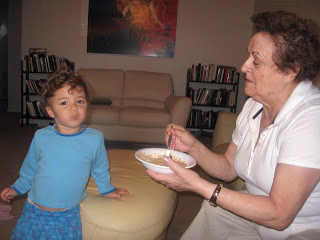
The author’s daughter and mother-in-law
This week, I’m living in a tri-lingual household — English, Portuguese and baby. It’s an interesting dynamic, because not one of us understands fully all three languages. My husband’s mother does not understand English but is fairly fluent in baby. My husband speaks both English and Portuguese, but I translate baby into English for him for the most part. And me? My rudimentary Spanish brings me no closer to understanding the Portuguese language than it brings me to understanding a Nirvana song.
Cheerfully, if quietly, we move ahead.
Having my mother in law here has shown me yet another magical component of babyhood: its lack of self-consciousness. Because baby is an ever-changing language, it often takes me dozens of times to truly understand the message my children are attempting to get across. That does not deter them. It does not deter me. For months now, I have happily been having half conversations with little understanding of the details. If I understand enough to give them a lollipop after they have spent ten minutes giving me precise instructions as to how it’s supposed to be done (“Mama. Pop. Oop, pop. Pink pop. Punkin. Bowl. Pop. Oop pop, mama.”) they are content. We strive for the big picture here.
They wait patiently for my adult brain to slowly make sense of what must be crystal clear to them. If I am obviously missing the point, they try another — equally obtuse and cryptic — way to show me what they are talking about. It’s really quite fun. Their lack of self-consciousness saves me from being frustrated at myself for not understanding them.
Sadly, this is lost as we move into adulthood.
Yesterday morning, my mother-in-law wanted to feed them breakfast. She managed, by using a few key words in English, to tell me she wanted to give them a banana, orange juice, cracker mix. Being who I am, I grabbed a banana, some orange juice, and graham crackers. No. That’s not it. She wanted something else.
She pointed at the graham crackers and shook her head. “Maria,” she said.
Maria?
I tried a different kind of cracker.
“No, no. Maria.” She started gesturing around the counter top area but could not find an object to help clarify her meaning.
I tried something completely different. “Do you mean the juice?”
“No, no.” She put her hands up in frustration and looked at me a bit sadly. “English I no understand.”
Her reaction confused me at first. Was she upset? Was she giving up, already? We’d just started the game I play with my babies dozens of times a day. Then, I realized that not understanding baby is different from not understanding other languages. It’s more acceptable, for some reason.
“Don’t give up yet,” I said, giving her my brightest smile. “We’ll figure it out. Try again. Say again.”
She looked at me, handed me the graham crackers, and said, “Maria.”
And it hit me.
And it hit me.
“Oh! Maria! You! The crackers that you brought! The green ones!” I searched my counter space. There they were, in a bag under my purse. And wouldn’t you know that not only is Maria her name, it’s also the name of the product.
Needless to say, she used real banana, juice from a real orange, and authentic Maria crackers to make the babies’ breakfast.
It’s a shame that we are so hard on ourselves all the time. It’s as if life continually beats us back into an area of self-doubt and self-disappointment. Though our languages may be different, and we may have trouble understanding the specifics, the big picture is clear and needs no language. We all love those babies.

